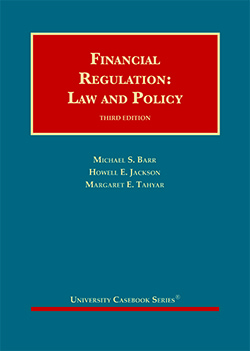- Home
- Financial Regulation: Law and Policy
Financial Regulation: Law and Policy
The Third Edition of Financial Regulation: Law and Policy continues to offer students and faculty an innovative and accessible introduction to the field. Financial regulation has long been at the intersection of technological innovation, market forces, and the political economy, punctuated from time to time by financial and economic crises. Since the turn of the millennium, we have seen these pressures intensify and multiply. We have lived through the most systemic Financial Crisis in 70 years, a major shift in regulatory design, the digital transformation of the economy, including the financial sector, and a worldwide Pandemic with still uncertain economic impact, playing out against an increasingly divided and shifting political landscape. The Third Edition has been updated to keep pace with all of these changes. You will find extensive discussions of fintech, climate change, and racial equality across the Third Edition, as these topics move from the periphery to the center of the regulatory agenda. The Third Edition also adds a stand-alone Chapter on supervision, an important topic that we expect will be receiving more academic research and attention, as well as an expanded Chapter on enforcement.
Like the Second Edition, the Third Edition analyzes and compares the market and regulatory architecture of the entire U.S. financial sector, from banks, insurance companies, and broker-dealers, to asset managers, fintech companies of many types, complex financial conglomerates, and government-sponsored enterprises. The Third Edition explores a range of financial activities, including consumer finance and investment, digital and traditional payment systems, securitization, short-term wholesale funding, money markets, and derivatives. Throughout the book, the authors note the cross-border implications of U.S. rules, and compare, where appropriate, the U.S. financial regulatory framework and policy choices to those in other places around the globe, especially the UK and the European Union.
Additional teaching materials are available, including Notes, Model Syllabi, Figures, and PowerPoint Slides.
For additional teaching modules on digital assets, climate change, and racial equity as well as updated materials and experiential materials for each chapter, visit the
authors’ site.
Imprint: Foundation Press
Series: University Casebook Series
Publication Date: 04/28/2021
Related Subject(s): Securities Regulation
Michael S. Barr, University of Michigan Law School
Howell E. Jackson, Harvard University Law School
Margaret E. Tahyar, Columbia University Law School
CasebookPlus™
This title is available in our CasebookPlus format. CasebookPlus provides support beyond your classroom lectures and materials by offering additional digital resources to you and your students. Anchored by faculty-authored formative self-assessments keyed to our most popular casebooks, CasebookPlus allows students to test their understanding of core concepts as they are learning them in class – on their own, outside of the classroom, with no extra work on your part. CasebookPlus combines three important elements:
- A new print or digital casebook
- Access to a downloadable eBook with the ability to highlight and add notes
- 12-month access to a digital Learning Library complete with:
- Chapter questions keyed to the casebook
- Black Letter Law questions (available in select subjects)
- Subject area review questions for end of semester use
Leading digital study aids, an outline starter, and audio lectures in select subjects
Students can still utilize CasebookPlus digital resources if they’ve purchased a used book or are renting their text by purchasing the Learning Library at westacademic.com.
With CasebookPlus, you can customize your students’ learning experience and monitor their performance. The quiz editor allows you to create your own custom quiz set, suppress specific quiz questions or quiz sets, and time-release quiz questions. Additionally, the flexible, customized reporting capability helps you evaluate your students’ understanding of the material and can also help your school demonstrate compliance with the new ABA Assessment and Learning Outcomes standards.
Learn more about this series.
Access Denied
Law School Faculty - Sign in or Create an Account to access this content. Law faculty who have created an account can sign in after receiving email notification that registration has been approved. Email accountmanager@westacademic.com or call 800-313-9378 for assistance.
Other Higher Education Faculty who wish to access digital review copies or teaching resources should contact their West Academic Account Manager at college@westacademic.com or 800-360-9378.
Adopters Only
This content is intended for adopters only. Sign in or Create an Account to access this content. Law faculty who have created an account can sign in after receiving email notification that registration has been approved. If you are an adopter who is unable to access this content after signing in, contact your account manager for assistance at accountmanager@westacademic.com or call 800-313-9378 for assistance.
Access Denied
Sign in or Create an Account to access this content. Faculty who have created an account can sign in after receiving email notification that registration has been approved. Contact us for assistance.
Law School Faculty: email accountmanager@westacademic.com or call 800-313-9378.
Other Higher Education Faculty: email college@westacademic.com or 800-360-9378.
Access Denied
Higher education faculty who wish to view this document should contact their West Academic Account Manager at college@westacademic.com or 800-360-9378.
